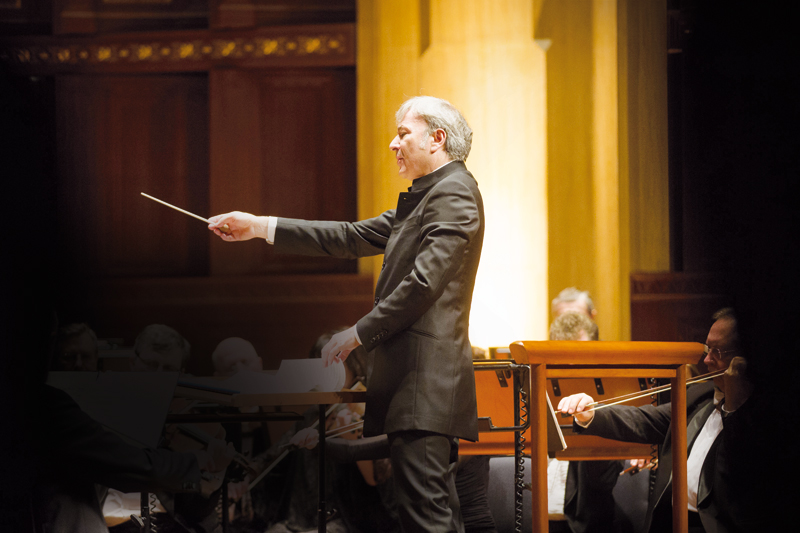

Sergey Krylov and the Russian National Orchestra make perfect partners
The 25-year-old Russian National Orchestra is one of the best in the world, and violinist Sergej Krylov is an undeniable living genius. Under the baton of world-renowned Italian maestro, Pier Carlo Orizio, they teamed up to perform one of the finest orchestral concerts yet heard at the Royal Opera House, Muscat on Wednesday evening.

The first of a brace of sold-out symphonic concerts opened with Saint-Saens’ Halloween-inspired tone-poem, “Dance Macabre”, with 12 notes from the harp (Svetlana Paramonova) signalling the stroke of midnight when witches and ghouls can play and dance in supernatural revelry till dawn. The devilish solo fiddle role was played superbly by Concert master Alexei Bruni, with double-string melodies and forbidden tri-tones ringing out across the dissonant harmonies from the ensemble. Xylophone player Alexander Surorov did a fine job of imitating the rattling bones of eerie skeletons, and the lost souls evaporated as quickly as they had appeared at the first rays of light.
The main course of the evening featured the 48-year-old Russian violinist, Sergey Krylov, as soloist in Mendelssohn’s fiendishly challenging (by his own admission) “Violin Concerto in E minor”. The work opens without introduction, straight into the memorable main theme with extraordinarily difficult intonation and leaps, and yet Krylov seemed to explore the changing moods in the work as effortlessly as it was dazzling. His astounding virtuosic technique glided through the written cadenza and fast passages with breath-taking accuracy, humour, and at other times, intense lyricism. The lasting impression of Krylov is of a musician totally at one with his instrument; he becomes the violin, and the intense second movement was made exquisite through his profound expressiveness and beautiful tonal quality. There were moments of such poignancy that the auditorium held a shared silence of focused concentration in the presence of this artistic genius. The final movement was electrically charged, exhausting for soloist, orchestra and audience alike. However, Sergej Krylov still had the energy and generosity to share one of his much loved solo fiddle encores, Paganini’s famous 1817 “Caprice no 24” in A minor has a theme and 11 variations and is widely considered to be one of the most difficult pieces ever written for solo violin. Sergej executed it with all the dexterity and freshness of a violinist who had not just performed one of the hardest concertos in the repertoire.

If the first half of the programme was from the traditional Romantic repertoire, the second was intense and passionate, drawing from the Nationalistic movement in music. Tchaikovsky is celebrated for his supreme skill in orchestration, and his 1880 Overture-fantasy, “Romeo and Juliet” is a gift to any orchestra, especially a Russian one. Based on three strands from the Shakespeare tragedy, the tone-painting of moods and emotions in this 20-minute symphonic poem highlighted the expertise and musicality in each section of this world-class orchestra. The sword-clashing battle between Montagues and Capulets was strong, powerful and rhythmically exuberant, in a work which is familiar, and yet not fully appreciated until it is heard live in an auditorium with sympathetic acoustics. On Wednesday it achieved an intensity of passion-rousing drama seldom experienced, while the percussion section was invigorating without reticence or self-consciousness. The brass was astounding, with confident strides as death-knells, Romeo’s throbbing heart-beat clearly heard in the horns, or evocative chorale-like chords for the saintly Friar Laurence’s ill-fated intentions. The Love-theme was sublime, when it finally arrived, rich and warm from the strings, yet hauntingly melancholic at the inevitability of the star-crossed lovers’ fate.
The selection of the rousing Finale for the concert was itself a stroke of genius. Ravel’s 1928 iconic experimentation in tonal colour, “Bolero”, is based on one repeated dance-rhythm and just two modal Spanish melodies for its entire 16-minute duration, evoking a drug-induced, Hispanic Sufi-like trance. It succeeds brilliantly, and for its performance the woodwind was expanded, and two saxophones, two extra trumpets and a piano were added. The violins played pizzicato until nearly the end, while snare drum and timps carried the relentless, hypnotic rhythm throughout, and so the Wind provided nearly all the melodic variations. The contribution of some of the finest musicians in the world - described as ‘a living symbol of the best in Russian art’ - made this Bolero performance compelling, intoxicating and utterly euphoric.
Impossible to follow, the Encore will be in Thursday’s concert when Sergey Krylov will perform Tchaikovsky’s ‘Violin Concerto in D major’ – an experience few will want to miss after hearing this supreme achievement of musical excellence, as close to perfection as one could possibly hope for.
Oman Observer is now on the WhatsApp channel. Click here



